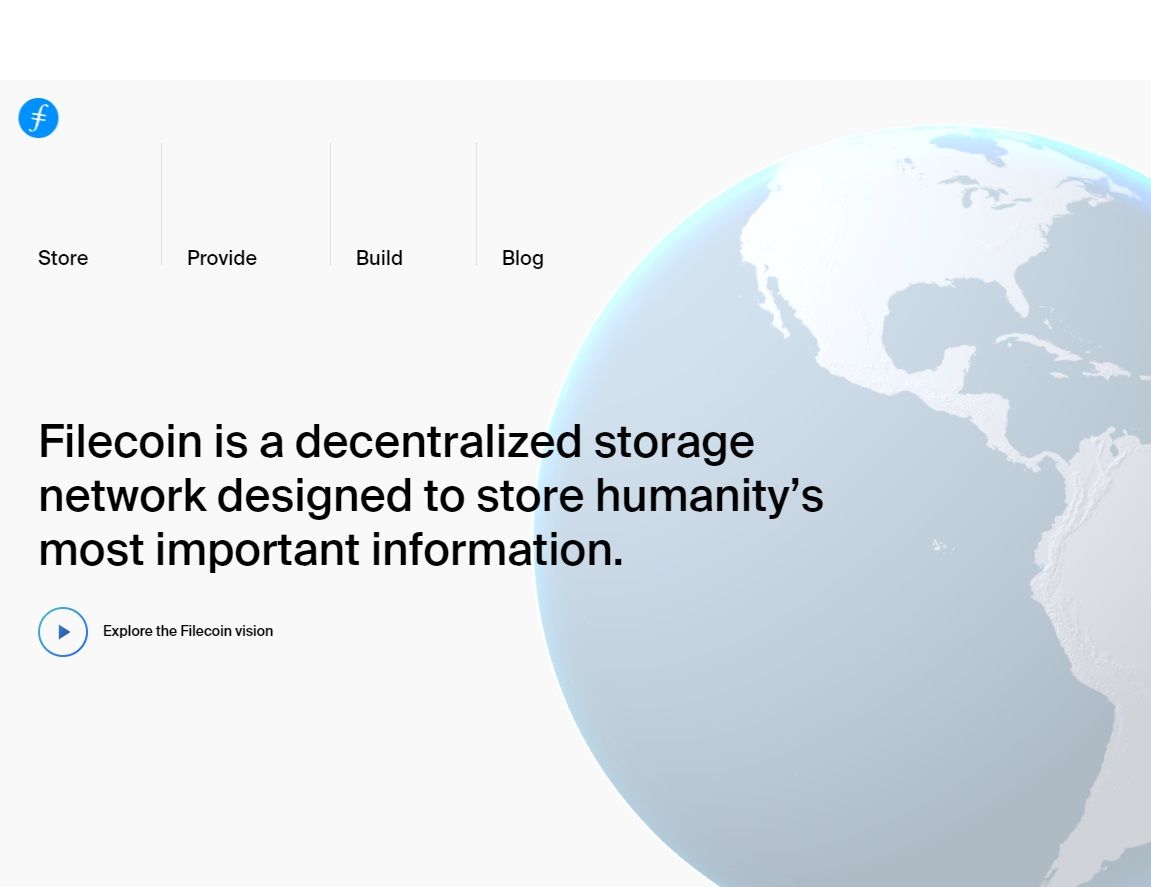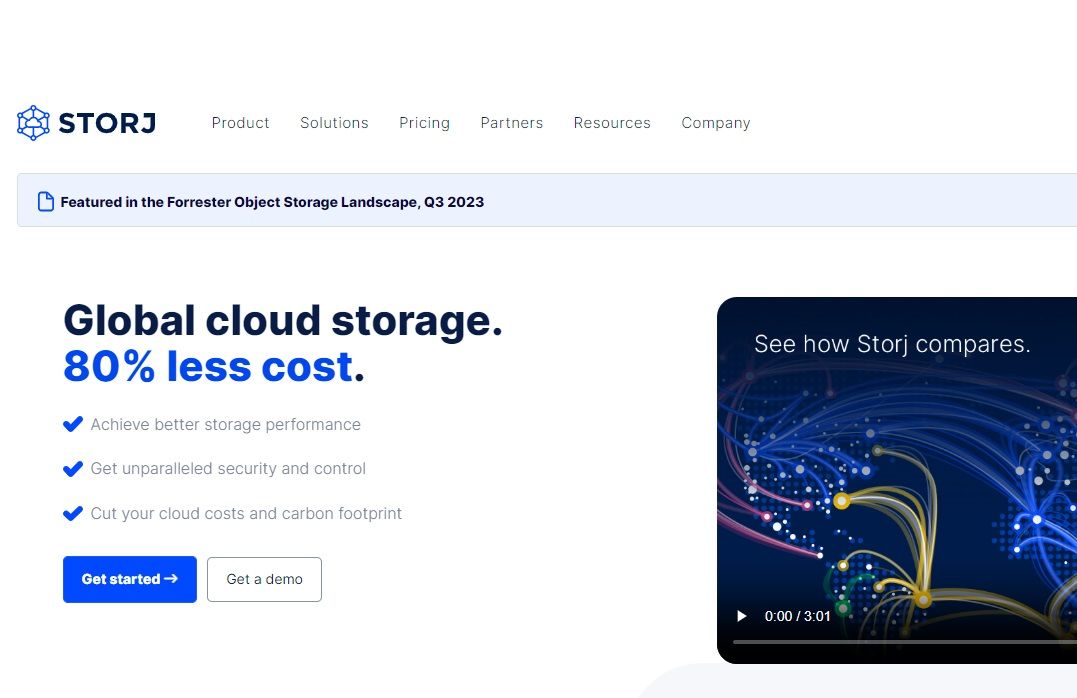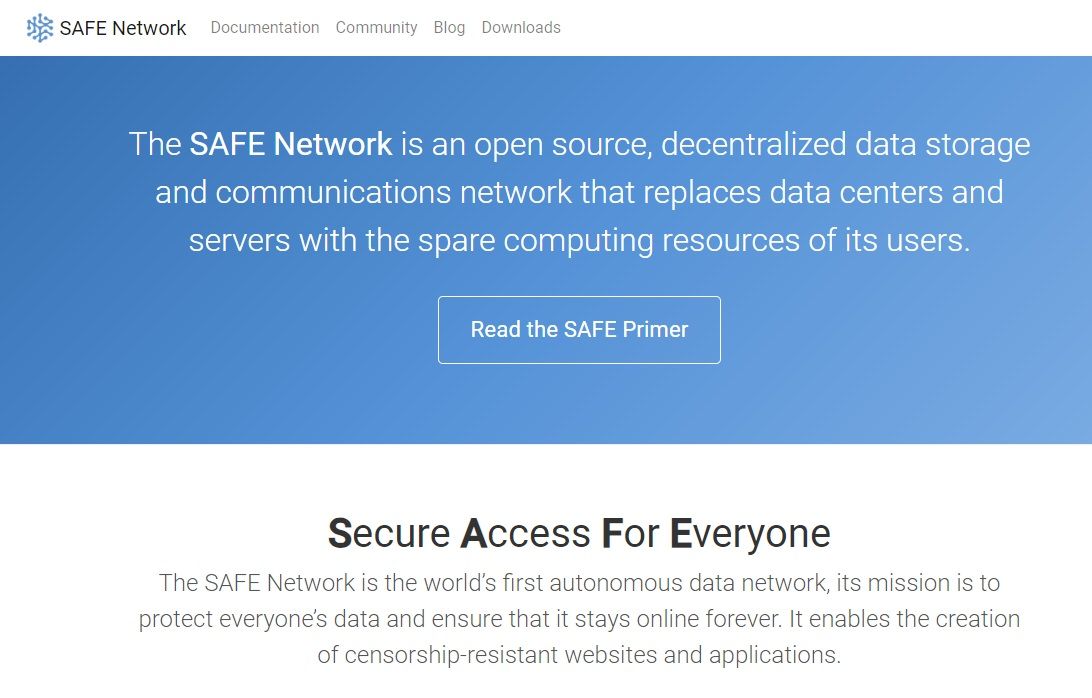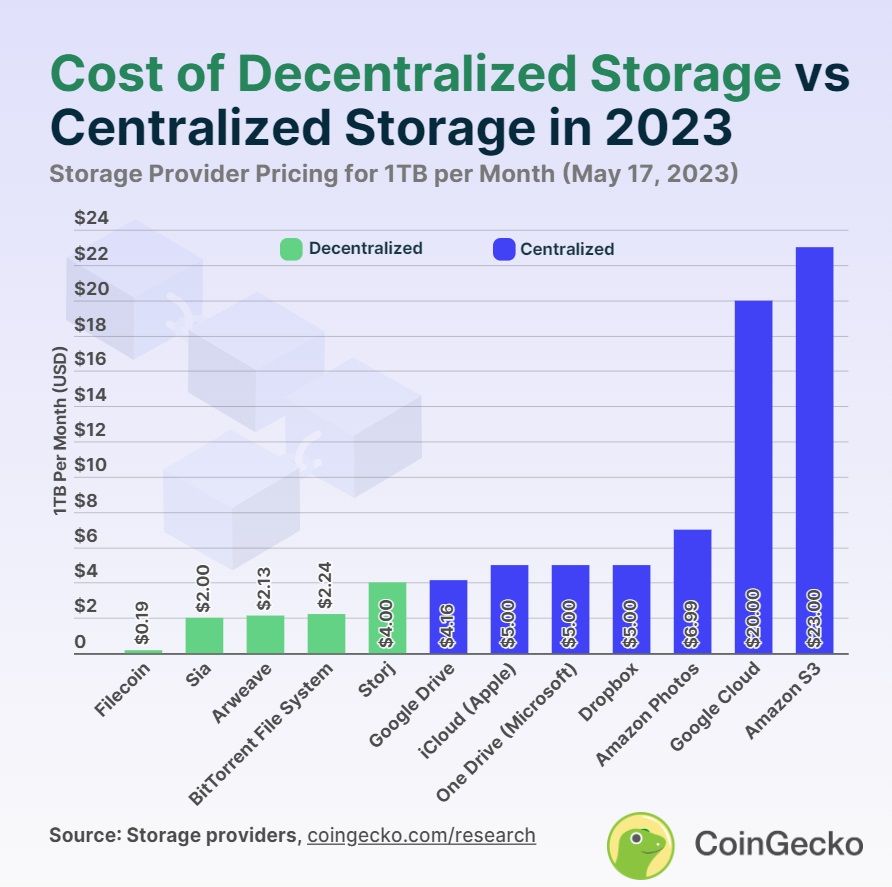Ah, the old guard of centralized storage solutions — the reigning champs of hefty costs, security slip-ups and data control drama. Centralized storage is like storing all your valuables in a single, heavily guarded fort. It may look impressive from the outside, but once inside, you realize only one person is watching over everything.
Demand for data storage has been on the up and up, driven primarily by an unsatiable appetite for information by large organizations. The data storage market is expected to grow to $56.7 billion by 2027 from $29.0 billion in 2020, according to one estimate.
However, traditional centralized storage solutions often come with high costs, security vulnerabilities, and limitations in data control. These systems, relying on single entities to manage and safeguard data, pose risks such as data breaches, privacy infringements and potential downtime.
In response to these concerns, decentralized storage platforms built on blockchain technology have emerged. It's like the leather jacket-wearing rebel of the storage world, flipping the bird to data breaches and downtime with a devil-may-care attitude. Say goodbye to snooze-fest security vulnerabilities!
![]()
In this article, we'll highlight the top decentralized storage platforms, their features, the benefits they provide and their cost relative to centralized cloud storage services.
Pitfalls of Centralized Storage
Today, the bulk of our personal data is housed within centralized systems.
Centralized storage systems, by nature, concentrate vast amounts of sensitive information within a single entity's infrastructure. While this consolidation streamlines data management and access, it also presents a tempting target for bad actors seeking to exploit vulnerabilities in the system. In addition, users entrust their data to these centralized platforms, relinquishing control over how it is stored, accessed and utilized.
This storage solution offers some advantages, primarily in terms of accessibility and management efficiency. This consolidation of data resources simplifies user access and streamlines administrative tasks.
Despite its conveniences, centralized data storage also presents inherent challenges, particularly concerning security and privacy. While data in transit from the user's device to the centralized storage server is often protected using 128-bit SSL encryption, and additional layers of security may be applied with 256-bit encryption upon storage, concerns persist regarding the vulnerability of centralized repositories to cyber threats and unauthorized access.
In addition, centralized storage systems are susceptible to single points of failure, meaning a security breach or system malfunction can result in widespread data loss or compromise. That's exactly what happened in February 2017 when an issue emerged with AWS S3 in the US-EAST-1 region. This incident resulted in a substantial portion of the internet being unavailable for around four hours.
What is a Decentralized Storage Network?
Blockchain technology offers a new approach to data management that prioritizes transparency, security and user sovereignty.
Decentralized storage networks offer an alternative to the traditional centralized storage model employed by big cloud companies. These file storage protocols break up your files into small pieces, distributing them across numerous computers linked together in a decentralized network.
Key characteristics of decentralized storage networks on blockchain entail:
- Decentralization: Data is spread across multiple nodes, removing dependence on a central authority for storage.
- Security: Data undergoes encryption and employs cryptographic methods to uphold privacy and security.
- Immutable Records: Utilizing blockchain technology ensures immutable records of data storage transactions, guaranteeing transparency and integrity.
- Incentive Mechanisms: Many decentralized storage networks integrate incentive mechanisms, such as token rewards, to encourage participants to contribute storage space and bandwidth to the network.
- Fault Tolerance: Decentralized storage networks are engineered to withstand failures by redundantly storing data across numerous nodes, mitigating the risk of data loss.
Top Decentralized Storage Platforms
Several decentralized storage platforms have gained prominence in the blockchain space. Here are the best blockchain storage projects!
Filecoin
Filecoin is a peer-to-peer network designed for secure file storage. Within Filecoin's framework, users compensate storage providers for housing their files. These providers, known as nodes in blockchain parlance, are tasked with securely storing files and adhering to storage protocols.
 Filecoin is a P2P Network for Secure File Storage. Image via Filecoin
Filecoin is a P2P Network for Secure File Storage. Image via FilecoinUnderpinning Filecoin is the same software as the IPFS protocol, a distributed storage network leveraging content addressing for permanent data references. However, Filecoin diverges from IPFS by incorporating an incentivization layer.
Unlike centralized models, Filecoin fosters an open marketplace for storage and retrieval, free from the control of any single entity. This decentralized approach ensures that available storage and pricing remain dynamic, subject to market forces rather than corporate dictates.
Filecoin enables several use cases, catering to Web3-native functionalities like storing NFTs and metaverse/game assets, incentivizing permanent data storage, and providing a cost-effective alternative for archiving Web2 datasets.
Our full Filecoin review goes into detail on its technology, team and much more!
Storj
Storj is a provider of globally distributed cloud object storage, offering an alternative to traditional S3-compatible solutions. Storj boasts durability and availability rates of 99.95%, alongside enhanced global performance from a single upload.
 Storj Provides an Alternative to Traditional S3-Compatible Solutions. Image via Storj
Storj Provides an Alternative to Traditional S3-Compatible Solutions. Image via StorjKey features of Storj include:
- S3 Compatibility: Integrate with Amazon Web Service S3-compatible tools by adjusting the endpoint and credentials, enabling quick setup and utilization.
- Third-party Tools: Compatibility with a plethora of tools enables diverse applications, including backups, large file transfers, file management, content delivery, and scientific data handling.
- End-to-End Encryption: Ensure data ownership and security with default encryption and user-assigned access grants, preventing unauthorized access or compromise of data without permission.
- Cost Efficiency: Enjoy cost-effective storage starting from $4.00 per TB per month, coupled with a competitive egress rate of $7.00 per TB per month. You can check out the Storj pricing page https://www.storj.io/pricing for more information.
- Multi-region Support: Access multi-region cloud object storage, distributing data across tens of thousands of storage nodes worldwide to enhance availability and redundancy.
- Open Source: Take advantage of transparency through Storj's open-source code, providing freedom from vendor lock-in and offering insight into technology and cost structures.
If this piqued your interest, head over to our full Storj review.
Safe Network
By downloading the Safe (Secure Access For Everyone) Network software, users gain access to many services including messaging, apps, email, social networks, data storage, video conferencing, and more – all for free.
 Safe Network Operates Autonomously to Ensure Data Security and Accessibility. Image via Safe Network
Safe Network Operates Autonomously to Ensure Data Security and Accessibility. Image via Safe NetworkStarted in 2006 by Scottish engineer David Irvine, MaidSafe is the core developer of the Safe Network. In contrast to conventional internet infrastructures reliant on data centres and servers, Safe Network leverages peer-to-peer technology.
Once your encrypted data is uploaded, the Safe Network operates autonomously to ensure its security and accessibility without human intervention. Utilizing intelligent algorithms, the network shifts data chunks between nodes, continually reassigning them to different groups to maintain security and privacy.
You retain complete control over the information you store, with the network guaranteeing its safeguarding and your autonomy at all times.
Arweave
Arweave is the first protocol designed to facilitate permanent data storage with the payment of a single, one-time fee. The protocol relies on a decentralized network of miners who store and replicate data in exchange for AR token rewards. These rewards are sustained by Arweave's sustainable endowment, ensuring continuous data availability while adhering to a transparent and immutable risk model.
 Arweave is the First Protocol to Facilitate Permanent Data Storage. Image via Arweave
Arweave is the First Protocol to Facilitate Permanent Data Storage. Image via ArweaveAt its core lies the permaweb, a permanent and decentralized web built on top of the Arweave. It offers a digital space where pages and applications can exist indefinitely, free from centralized control. The permaweb is comprised of a set of modular and interchangeable protocols.
Our full Arweave review also touches on its use cases, the tech, and its native token.
What are the Benefits of Decentralized Storage Networks?
Decentralized storage networks offer several advantages over their centralized counterparts:
- Heightened Security: Decentralized data storage services employ encryption and distributed storage mechanisms, which serve to bolster security. By dispersing data across multiple nodes and encrypting it, the risk of unauthorized access or breaches is significantly diminished.
- Privacy Protection: Users enjoy greater data control within decentralized storage networks, minimizing exposure to third-party surveillance or data exploitation.
- Improved Resilience: Designed to withstand failures, decentralized storage networks replicate data across numerous nodes. This redundancy minimizes the impact of hardware malfunctions or cyber threats.
- Cost-Effectiveness: Decentralized storage networks often deliver economical solutions relative to traditional centralized providers. Leveraging existing resources and incentivizing participants to contribute storage space enables competitive pricing without sacrificing reliability or security.
- Empowerment and Autonomy: Users gain enhanced control over their data with decentralized storage networks. They dictate data storage parameters and locations independently, freeing them from reliance on centralized entities.
- Transparent and Immutable Record-Keeping: Many decentralized storage networks leverage blockchain technology for recording storage transactions immutably. This ensures transparency and integrity, allowing users to verify storage and retrieval activities on the network.
How Much Do Decentralized Storage Platforms Cost?
CoinGecko set out to compare the costs of centralized and decentralized storage options, both for personal and enterprise use cases.
For personal data storage, decentralized options are significantly cheaper on average compared to centralized ones. The average cost for 1TB/month of storage is $2.11 for decentralized storage, whereas centralized options averaged at $9.88. This represents a substantial cost savings of approximately 78.6% when opting for decentralized storage solutions.
Even at the highest end of decentralized storage pricing, the most expensive option (Storj) still comes in slightly cheaper than the cheapest option among centralized storage providers (Google Drive). Storj charges $4.00 for storage, while Google Drive charges $4.16. However, it's important to note that Storj charges separately for file retrieval bandwidth at $7.00/TB, according to CoinGecko research.
 Decentralized Storage Options Are Significantly Cheaper Than Centralized Ones. Image via CoinGecko
Decentralized Storage Options Are Significantly Cheaper Than Centralized Ones. Image via CoinGeckoAre Blockchain-Based Platforms the Future of Data Storage?
Blockchain technology may just be the future of data storage services and here's why!
Its decentralized and distributed nature offers scalability, enabling it to cater to the needs of organizations of all sizes. This scalability ensures that blockchain tech can accommodate the data requirements of small startups to large enterprises without compromising performance or efficiency.
The decentralized architecture of blockchain eliminates the reliance on a single central authority, thereby reducing the risk of system failures or bottlenecks that are often associated with centralized systems.
The efficiency can translate into significant cost savings for businesses. By leveraging blockchain technology, organizations can streamline their data storage processes, reducing overhead costs associated with traditional storage solutions. This efficiency also enables faster access to data, improving overall operational efficiency.
One of the best things about blockchain is how secure it is. Your data is protected by advanced encryption and spread out across many different computers, making it nearly impossible for hackers to break in. It's like storing your valuables in a super-secure vault that only you can access.
With blockchain, it's easy to track where your data comes from and where it goes. Think of like having a GPS tracker for your information, so you always know where it's been and where it's headed next. This makes it perfect for businesses that need to keep tabs on their data at all times.

Top Decentralized Storage Platforms: Closing Thoughts
Add data storage to the list of sectors disrupted by blockchain technology! While centralized storage systems offer convenience in accessibility and management, they also come with inherent vulnerabilities such as security breaches and data control limitations.
Decentralized storage platforms are changing the way data is stored and managed. Decentralized storage offers enhanced security, is highly scalable, offers an increased level of control and promotes transparency and accountability. Platforms like Filecoin, Storj, Safe Network and Arweave are some of the major players within this space, offering enhanced security, privacy protection, resilience against failures, cost-effectiveness and user empowerment.
As both businesses and individuals adopt decentralized storage solutions, the data management arena stands on the brink of significant change, heralding a fresh era characterized by innovation and potential advancement.




